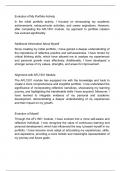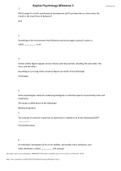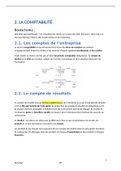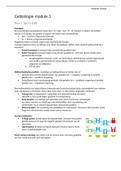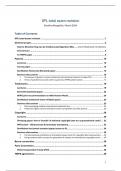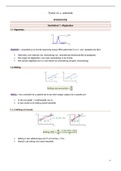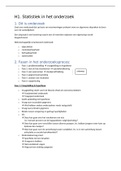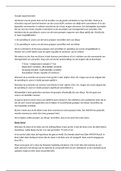Bar Exams - Ethics - Barristers' Rules
BR 3: Objects - the object of these rules is to ensure that barristers... - ANS-(a) act in
accordance with the general principles of professional conduct;
(b) act independently;
(c) recognise and discharge duties re administration of justice;
(d) provide services of the highest standards unaffected by personal interest.
BR 4: Principles - these rules are made in the belief that barristers... - ANS-(a)
paramount duty is to the administration of justice;
(b) must maintain high standards of professional conduct;
(c) must act honestly, fairly, skilfully, bravely and with competence and diligence;
(d) owe duties to court, clients and colleagues
(e) must exercise forensic judgment and give advice independently and for proper
admin of justice (regardless of contrary client desires)
(f) Bar must accept briefs regardless of personal beliefs, only refuse briefs of proper
professional grounds and should compete as specialist advocates with each other.
BR 8: [Advocacy Rules] General - A barrister must not engage in conduct which is ...
Cases: Costigan & Dwyer; Cummins; MacIntyre; - ANS-(a) dishonest or otherwise
discreditable;
(b) prejudicial to the administration of justice; or
(c) likely to diminish public confidence or bring into disrepute profession or admin of
justice.
BR 11: Work of a barrister - a barristers' work consists of... - ANS-Appearing as an
advocate, preparing to appear as an advocate, negotiating with opponent to
compromise case, mediation / arbitration, giving legal advice, preparing or advising on
docs for a client related to case or other affairs, carrying out work properly incidental to
any of the aforementioned and any such work commonly carried out by barristers.
BR 13: A barrister must not do the following kinds of work... (unless in personal capacity
and without a fee: BR 14) - ANS-Act as general agent or attorney, conduct
correspondence in barrister's name on anyone's behalf other than opponent, place
themselves at risk of becoming a witness by investigating facts (except: conferring with
witnesses, examining docs, viewing place or things or library research), act as only
representative in dealings with court (otherwise than when actually appearing),
, commencing / filing / serving docs, conducting conveyance, administering trust / estate,
obtaining probate or letters of admin, incorporating companies, preparing or lodging.
BR 17: Cab-rank principle - what is the rule? - ANS-A barrister must accept a brief to
appear before a court in a field in which the barrister practices if:
(a) the brief is within the barrister's capacity, skill and experience;
(b) the barrister is available to appear / prepare (not already committed with real
possibility of impacting);
(c) fee offered on the brief is acceptable
(d) barrister is not obliged or permitted to refuse under BR 101, 103, 104 or 105
AND BR 21: the above only applies to briefs from solicitors - do not have to accept
direct access briefs
BR 22: What does barrister have to do if accepting direct access brief? - ANS-(a) inform
prospective client in writing of: (i) the effect of BR 11 and 13; (ii) circumstances may
require solicitor to be retained on short notice; (iii) any other disadvantage (barrister
believes on reasonable grounds); (iv) compare capacity of B to provide services to B
and solicitor; (v) fair description of the barrister's advocacy experience
(b) obtain written acknowledgement that above advice given
What are barristers' duties to the court? (BR 23 - 26, 29, 34)
Cases: Kaye v Woods; Kelly - ANS-BR 23: A barrister has an overriding duty to the
court to act with independence in the interests of the administration of justice.
BR 24: not to deceive or knowingly or recklessly mislead the court.
BR 25: take all necessary steps to correct any misleading statement (asap once aware).
BR 26: In civil proceedings - must correct mistake of opponent re evidence, case law or
legislation.
BR 29: inform court of binding or appellate authorities and relevant legislation known to
B and reasonable grounds to believe on point (may have to write to the court: BR 31).
BR 34: inform court of apparent misapprehension re effect of order.
What are barristers' duties to court in ex parte interlocutory applications? (BR 27 & 28) -
ANS-BR 27: Must disclose to the court all factual or legal matters which (a) are within
the barrister's knowledge; (b) are not LPP; and (c) has reasonable grounds to believe
would support an argument against granting relief or limiting its terms adversely to the
client. PLUS BR 28: must seek instructions to disclose LPP matters and if not given
then inform client of obligations and refuse to appear.
What are barristers' duties to the client? (BR 35 to 37)
BR 3: Objects - the object of these rules is to ensure that barristers... - ANS-(a) act in
accordance with the general principles of professional conduct;
(b) act independently;
(c) recognise and discharge duties re administration of justice;
(d) provide services of the highest standards unaffected by personal interest.
BR 4: Principles - these rules are made in the belief that barristers... - ANS-(a)
paramount duty is to the administration of justice;
(b) must maintain high standards of professional conduct;
(c) must act honestly, fairly, skilfully, bravely and with competence and diligence;
(d) owe duties to court, clients and colleagues
(e) must exercise forensic judgment and give advice independently and for proper
admin of justice (regardless of contrary client desires)
(f) Bar must accept briefs regardless of personal beliefs, only refuse briefs of proper
professional grounds and should compete as specialist advocates with each other.
BR 8: [Advocacy Rules] General - A barrister must not engage in conduct which is ...
Cases: Costigan & Dwyer; Cummins; MacIntyre; - ANS-(a) dishonest or otherwise
discreditable;
(b) prejudicial to the administration of justice; or
(c) likely to diminish public confidence or bring into disrepute profession or admin of
justice.
BR 11: Work of a barrister - a barristers' work consists of... - ANS-Appearing as an
advocate, preparing to appear as an advocate, negotiating with opponent to
compromise case, mediation / arbitration, giving legal advice, preparing or advising on
docs for a client related to case or other affairs, carrying out work properly incidental to
any of the aforementioned and any such work commonly carried out by barristers.
BR 13: A barrister must not do the following kinds of work... (unless in personal capacity
and without a fee: BR 14) - ANS-Act as general agent or attorney, conduct
correspondence in barrister's name on anyone's behalf other than opponent, place
themselves at risk of becoming a witness by investigating facts (except: conferring with
witnesses, examining docs, viewing place or things or library research), act as only
representative in dealings with court (otherwise than when actually appearing),
, commencing / filing / serving docs, conducting conveyance, administering trust / estate,
obtaining probate or letters of admin, incorporating companies, preparing or lodging.
BR 17: Cab-rank principle - what is the rule? - ANS-A barrister must accept a brief to
appear before a court in a field in which the barrister practices if:
(a) the brief is within the barrister's capacity, skill and experience;
(b) the barrister is available to appear / prepare (not already committed with real
possibility of impacting);
(c) fee offered on the brief is acceptable
(d) barrister is not obliged or permitted to refuse under BR 101, 103, 104 or 105
AND BR 21: the above only applies to briefs from solicitors - do not have to accept
direct access briefs
BR 22: What does barrister have to do if accepting direct access brief? - ANS-(a) inform
prospective client in writing of: (i) the effect of BR 11 and 13; (ii) circumstances may
require solicitor to be retained on short notice; (iii) any other disadvantage (barrister
believes on reasonable grounds); (iv) compare capacity of B to provide services to B
and solicitor; (v) fair description of the barrister's advocacy experience
(b) obtain written acknowledgement that above advice given
What are barristers' duties to the court? (BR 23 - 26, 29, 34)
Cases: Kaye v Woods; Kelly - ANS-BR 23: A barrister has an overriding duty to the
court to act with independence in the interests of the administration of justice.
BR 24: not to deceive or knowingly or recklessly mislead the court.
BR 25: take all necessary steps to correct any misleading statement (asap once aware).
BR 26: In civil proceedings - must correct mistake of opponent re evidence, case law or
legislation.
BR 29: inform court of binding or appellate authorities and relevant legislation known to
B and reasonable grounds to believe on point (may have to write to the court: BR 31).
BR 34: inform court of apparent misapprehension re effect of order.
What are barristers' duties to court in ex parte interlocutory applications? (BR 27 & 28) -
ANS-BR 27: Must disclose to the court all factual or legal matters which (a) are within
the barrister's knowledge; (b) are not LPP; and (c) has reasonable grounds to believe
would support an argument against granting relief or limiting its terms adversely to the
client. PLUS BR 28: must seek instructions to disclose LPP matters and if not given
then inform client of obligations and refuse to appear.
What are barristers' duties to the client? (BR 35 to 37)

